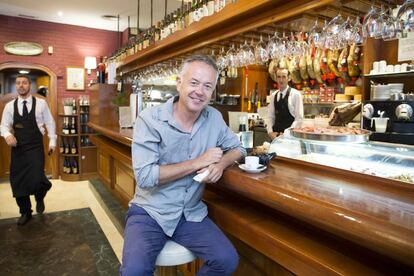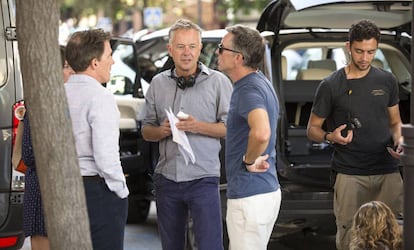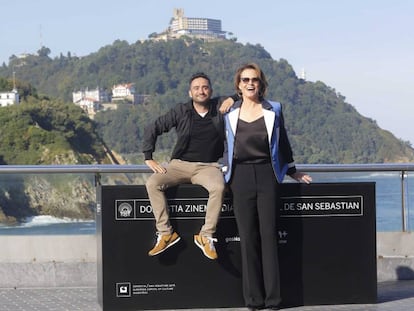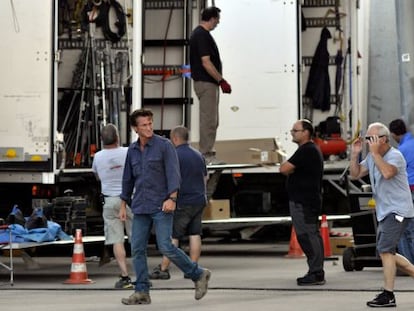The Trip to Spain: Michael Winterbottom tackles Iberia
Filmmaker joins Steve Coogan and Rob Brydon to mull over food, the universe and everything else


They polished off plates of anchovies, octopus and sole that were declared “glorious” while discussing Don Quixote and Sancho Panza in the Txoko de Getaria restaurant outside San Sebastián in the Basque Country. Somewhere in Santander, in a place whose name they can’t remember, someone gave them fresh rustic bread and butter that still makes their mouths water, and in the Etxebarri de Axpe in Vizcaya province, they delved into the world of grilled cuisine before moving on to Malaga, where they practically passed out from the Russian salad and ham in a fabulous tavern near the Malagueta beach .
“They” are British funnymen Steve Coogan and Rob Brydon and this is their third jaunt together to savor local cuisine and mull over issues ranging from the divine to the purely human. It is The Trip to Spain, a gastronomic and philosophical road movie that director Michael Winterbottom is winding up in Malaga – the final part of a trilogy that started in 2010 as a BBC TV series before hitting the big screen as The Trip, followed in 2014 by The Trip to Italy.
The idea most Brits have of Spain as little more than a summer holiday destination is unfair Steve Coogan
The hedonistic journey through England, the trip through Italy and the new adventure sampling the traditional cuisine of the Iberian Peninsula – along with his 24 Hour Party People, which looked at the 1970s Manchester music scene – represent the brighter side of Winterbottom’s filmography.
One of the most distinguished directors of his generation in Europe, the Lancastrian has never shied away from turning grim reality into compelling dramas that have won awards at international film festivals such as Welcome to Sarajevo, The Road to Guantanamo and In This World.
“At times you have to focus on fun and happy stuff and at other times you have to look at the darker side of things,” says Winterbottom while eating a plate of paella in front of the Refectorium restaurant in Malaga, where he is shooting the last scenes of The Trip to Spain. “Then there are the gray areas in between. For instance, I like working with Steve Coogan and Rob Brydon because they tackle the serious side of life but in a funny way.”
Santander, Getaria, Axpe, Sos del Rey Católico, and Malaga: these are the pit stops on Winterbottom’s journey through Spain during which Coogan and Brydon explore questions such as who we are and who we once were with plenty of humor and improvisation. It’s a similar formula to The Trip to Italy, which has just hit cinemas in Spain, and in which the two comedians eat ravioli, imitate Al Pacino, Robert de Niro and Marlon Brando in The Godfather, recite Lord Byron and laugh about everything – including Stephen Hawkings’ legs.
“The way we work is similar in all three films; they’re all road movies that center around food, but the content in itself is obviously different. In the Italian film, Steven and Rob talk non-stop about food and Lord Byron and Mary Shelley’s trips to Italy – what is sacred to a lover of English literature,” says Winterbottom. “In Spain, they also talk incessantly about food… and Don Quixote and Sancho Panza.”

Winterbottom’s modus operandi in all three films is to provide the basic skeleton and then rely on improvisation. In other words, it’s pure jazz. “Obviously, we have a script and so there’s a line to follow,” says the director. “Before shooting, the three of us talk about ideas that could be fun to explore but what I’m most interested in is keeping the conversations as natural and spontaneous as possible, so we’ve done a lot of improvisation. I would say that like the English and Italian ones, the film has a lot in common with jazz.”
Having just scarfed a plate of Iberian ham, the two comedians offer their opinion about the film. “Michael can say what he wants about there being a script and so on but I can assure you that 80% of what we shoot in the trilogy is improvised,” says a serious Coogan, a long-term friend of both the director and Brydon.
“Yes, there’s a skeleton script by the director that tells us what direction to take things and then there’s us and we tend to go off-script when we want to,” agrees Brydon. “It’s a very enjoyable way of working. We have to follow the plot of course, but we also get the chance to create our own stuff and we do that through improvisation.”
English version by Heather Galloway.
A tour of Spain – food and fun
“We didn’t have a specific gastronomic guide for this tour of Spain,” says Michael Winterbottom, something of a connoisseur of the country.
“The fact is we didn’t need one. I’ve traveled round Spain before: I’ve been to Valencia with my children and also to Malaga and – what do you call it? – Sanlúcar in Cádiz, and also to San Sebastián for the film festival. My goodness, the food there! The bars! But at the end of the day, although we tried to stop in places where the food played a big role, it wasn’t the most important thing. The key was to find places that allowed Steve and Rob to talk about things – stories about the country.”
The two actors were impressed by Spain on many levels. “The countryside is often not very European,” says Brydon. “Very unlike the rest of Europe, I would say. Sometimes you see places that remind you of the United States and the next day you could be in Africa… it’s strange, incredible and very pretty.”
Steven Coogan adds: “The idea most Brits have of Spain as little more than a summer holiday destination is unfair. Many of them have no idea, for example, that the English had a big presence in Andalusia, around Jerez. Spanish culture is a very rich culture. In the film, we discuss the subject of Moors and Christians, for instance and the shifts in power between them… and we’ve also put it in a contemporary context, exploring what’s happening now, you know… And we joke about it all, of course. Although I try to be more serious and Rob funnier.”
“Humor doesn’t have boundaries,” Rob points out, “and that’s what’s great about it.”
Tu suscripción se está usando en otro dispositivo
¿Quieres añadir otro usuario a tu suscripción?
Si continúas leyendo en este dispositivo, no se podrá leer en el otro.
FlechaTu suscripción se está usando en otro dispositivo y solo puedes acceder a EL PAÍS desde un dispositivo a la vez.
Si quieres compartir tu cuenta, cambia tu suscripción a la modalidad Premium, así podrás añadir otro usuario. Cada uno accederá con su propia cuenta de email, lo que os permitirá personalizar vuestra experiencia en EL PAÍS.
En el caso de no saber quién está usando tu cuenta, te recomendamos cambiar tu contraseña aquí.
Si decides continuar compartiendo tu cuenta, este mensaje se mostrará en tu dispositivo y en el de la otra persona que está usando tu cuenta de forma indefinida, afectando a tu experiencia de lectura. Puedes consultar aquí los términos y condiciones de la suscripción digital.









































